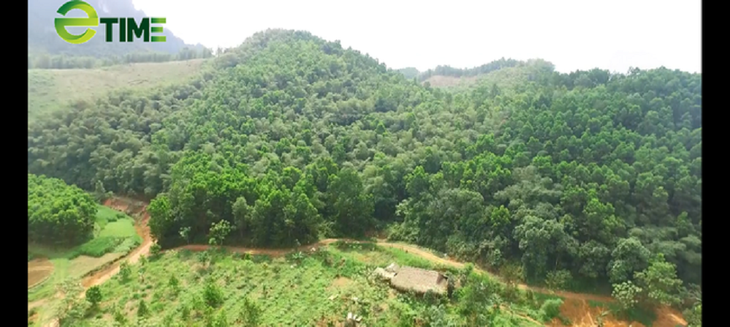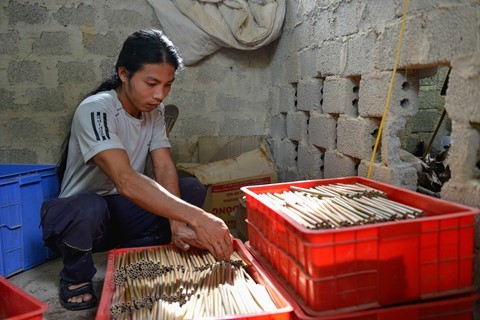(VOVWORLD) - A young couple, who left behind the hustle and bustle of city life, have turned Hon My farm in Thanh Hoa province, into a place where people can experience a new way of life that’s closer to nature and environmentally friendly. VOV’s Phuong Chi visited the farm and talked to the couple.
 Hon Mu farm (Photo: etime.danviet.vn) Hon Mu farm (Photo: etime.danviet.vn) |
In 2013, after 4 years of struggling to earn a living in the city, Le Xuan Hoa returned home to Thanh Hoa province to farm on a 10-hectare tract that his parents reclaimed next to Hon Mu Mountain in Tan Thanh commune.
On a bare hill Ha began to grow acacia mangium and various species of bamboo trees. After getting married and having children, he and a few of his neighbors reclaimed some virgin land, planted trees on it, and opened Hon Mu farm.
Ha recalled, “I decided I didn’t want to live alone there and started a village on my land. Hon Mu farm began to take shape. I reclaimed land for houses and gardens and stocked some supplies. After a period of time, the first guests began to arrive.”
A new day at Hon Mu begins with chickens scratching for food, bees sucking nectar from the flowers, and Ha’s children, who are 7 and 5, catching tiny shrimps in the spring for lunch. Ha begins his day by playing his favorite flute melody on the bank of the spring.
Hon Mu farm is not really a tourist destination, but it attracts visitors who love exploring nature. Ha offers free stays at the farm, but those who want to stay for more than a day or two must set up a camp, pick their own vegetables, catch their own fish, and cook their own meals.
Most of what is consumed on the farm is produced on the farm. You can wash your hair with shampoo made from soapberries, bathe in herb-infused water, and brush your teeth with toothpaste made from salted lemon and betel leaves.
Hon Mu makes money by selling guests lemongrass attar and handicraft items as souvenirs of their visit.
During their stay, guests can meditate and chat about health and nature with their hosts. People come here from the city out of curiosity, but some become bewitched by the green lifestyle and a few have stayed for two and a half years. The farm has 7 cottages, 4 of which were built by the guests themselves.
The Thai and Muong ethnic people who live in the nearby hamlets taught Ha how to grow the bamboo he uses in his handicraft workshop.
Le Thi Ung, Ha’s wife, said, “We decided to make handicrafts to provide ourselves some income and take advantage of the available materials of rattan and bamboo. The locals no longer sell their bamboo to paper mills for a few dollars a ton. Now they sell it to us to make handicraft products for ten times what they used to get. I buy materials from the nearby hamlets and only stay at home to make the handicraft items.”
 Hon Mu bamboo straws are exported to France, Germany, and Japan. (Photo: Zing) Hon Mu bamboo straws are exported to France, Germany, and Japan. (Photo: Zing) |
Hon Mu craft products are sold at trade fairs in Thanh Hoa province. The workshop produces 50,000 to 100,000 bamboo straws per month, which earns about 2,200 USD.
The straws are sold online through social networks and exported to France, Germany, and Japan via agents.
Vi Nguyen Huynh, Deputy Head of the district agriculture section, told us Hon Mu’s bamboo straws have been designated a signature product of Thuong Xuan district.
Huynh said, “Environment-friendly products tend to be favored over plastic products, which are harmful to human health. The district has adopted a policy promoting the bamboo straws.”
Ha was once considered an eccentric person, but he has made his farm an environmentally-friendly and profitable model for others to follow.